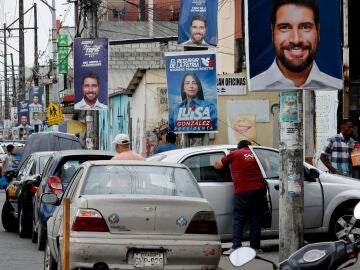
More of 13.4 million Ecuadorians are summoned this Sunday to the polls to vote in some unprecedented general electionswhich are held in the middle of a escalation of violence attributed to organized crimewhich had one of its most recent and tragic episodes in theassassination of presidential candidate Fernando Villavicencio.
In the process, which began last Thursday with the vote of prisoners without a final sentence, and continued on Friday with the vote at home for people over 50 years of age or people with disabilities of more than 75%, Ecuadorians will designate the successor or successor to the current president, the conservative William Lassoand the 137 new members of the National Assembly (Parliament).
This occurs after last May Lasso dissolved the Assembly, with an opposition majority, when he was preparing to vote a motion of no confidence against him for alleged embezzlement (embezzlement), which he denied, and requested the call for elections, protected by the constitutional appeal known as “cross death”.
For this reason, the winners must complete the Lasso period (2021-2025), which decided not to stand for re-election or present lists to the Assembly. Thus, in the presidential race there are eight candidates: the lawyer and former assembly member Luisa González, candidate of the Correísta movement Revolución Ciudadana, led by former president Rafael Correa (2007-2017); former Vice President Otto Sonnenholzner, and former Legionnaire and security specialist businessman Jan Topic. Also in the race are the indigenous ecologist Yaku Pérez, the businessmen Xavier Hervas and Daniel Noboathe independent lawyer Bolívar Armijos and the journalist Christian Zurita, who replaces Villavicencio and whose candidacy is still waiting to conclude the registration process.
The votes that are consigned to Villavicencio -whose photo will be on the ballot-, will be awarded to Zurita, even if his firm registration is confirmed after the elections, which will have a second round on October 15 if none achieves no less than 40 % of the votes and a difference of ten points over the rest.
The focus on citizen security in the face of the escalation of violence
The candidates have focused their campaigns on various offers to combat one of the main concerns of the population: the unprecedented insecurity and violence plaguing Ecuador, attributed by the authorities to organized crime and drug trafficking, which made Ecuador pass in barely five years from 5.8 to 25.32 intentional homicides per 100,000 inhabitants in 2022, the highest figure in its history.
Robberies, assaults, murders at the hands of hit men, extortion and kidnapping are some of the crimes that are heard daily in Ecuador, formerly known as a redoubt of peace in the region, but now become a key point for drug mafias to, through its ports, ship to Europe and North America large quantities of cocaine produced in its neighbors Colombia and Peru, the two largest world producers.
In this spiral of violence, the assassination of Villavicencio took place, riddled with Colombian hitmenon August 9, after leaving a rally for his electoral campaign, a few days after he publicly denounced having received death threats, presumably from one of the leaders of these criminal gangs that the candidate had promised to fight without hesitation.
Villavicencio thus became the most representative face of this phenomenon that has already taken the lives of other politicians, candidates, mayors, judges and prosecutors, mainly from the coastal cities where drug trafficking is most present.
Source: Lasexta
Ricardo is a renowned author and journalist, known for his exceptional writing on top-news stories. He currently works as a writer at the 247 News Agency, where he is known for his ability to deliver breaking news and insightful analysis on the most pressing issues of the day.












